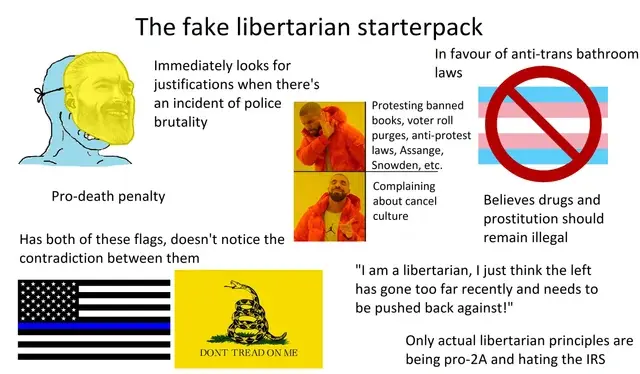this post was submitted on 30 Jul 2023
485 points (91.2% liked)
Political Memes
8104 readers
2142 users here now
Welcome to politcal memes!
These are our rules:
Be civil
Jokes are okay, but don’t intentionally harass or disturb any member of our community. Sexism, racism and bigotry are not allowed. Good faith argumentation only. No posts discouraging people to vote or shaming people for voting.
No misinformation
Don’t post any intentional misinformation. When asked by mods, provide sources for any claims you make.
Posts should be memes
Random pictures do not qualify as memes. Relevance to politics is required.
No bots, spam or self-promotion
Follow instance rules, ask for your bot to be allowed on this community.
No AI generated content.
Content posted must not be created by AI with the intent to mimic the style of existing images
founded 2 years ago
MODERATORS
you are viewing a single comment's thread
view the rest of the comments
view the rest of the comments

Sorry, didn't mention the others but generally things that are for the public benefit/use should be maintained through tax dollars without profit-pressure to extract 'value'. How does a fire department generate revenue? Or police? They don't and they shouldn't be designed to - they're a public utility for the supposed benefit of all in the community.
Firefighters should be a private enterprise and figure their revenue streams out themselves. They don't need the government telling them how to run a business.
Roads can easily made all private for-profit toll roads and people could decide for themselves if they want to use the McHighways or the WalMiles.
Roads are a complicated issue. I feel that roads fall under the idea of an "intrinsic monopoly" -- by their very existence, they create a monopoly, and are thus anti-competitive, and thus anti-free-market.
I would argue that it depends on context. Take the following two examples:
In the first example, a fire on one person's property can quickly threaten the property of many others around it. This danger could be argued to be so great that, if in a system where each individual must pay for fire services, and one individual does not, this can be seen as a threat to the livelihood of others -- a form of "aggression", if you will. It would be in everyone's best interest to have a municipal, or community fire department that the public pays for.
In the second example, no dwelling, or proprety is realistically a threat to any other. The only danger is to one's own property. As a result, it could be argued that, in such a situation, the individual could not be expected to pay for the fire service. If they wish to have its benefits, they could choose to pay, say, a subscription fee.
Generally, I would be inclined to agree, but one must tread cautiously.
Presumably, one could pay a subscription fee for the pleasure in having the added level of safety, similar to paying for insurance; however, it could be argued that, in certain scenarios, the lack of a publicly funded, mandatory fire department is an intrinsic threat from one to another. For example, if you look at a densely packed city, a fire can spread very rapidly, and indiscriminately. This would be funded through tax dollars. In other scenarios, for example, a rural, sparsely populated region of farmland, there could be no perceived intrinsic thread, so a mandatory fire department would not be necessary.
I would argue that it would be a conflict of interest for police to be payed. One could pay for their own private security, sure, but the state should provide the means to ensure that the rights, and freedoms of the individual are upheld. This is outlined in something called a Night-Watchman State.
This does raise the question if everyone must pay taxes for utilities even if they do not use them. I would personally argue that no an individual should not be expected to pay for a utility that they are not using.